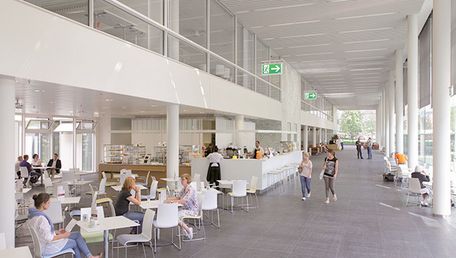Key research areas:
- Klöcker: analysis and functional characterization of ion channel and receptor complexes
- Gottmann: synaptogenesis and synapse loss, synaptic cell adhesion molecules, neuronal differentiation of stem cells
- Sergeeva: molecular neurophysiology of ionotropic receptors
- Haas: aminergic systems in brain, sleeping and waking
- Selbach: synaptic plasticity, clock genes
Research
Coding and conveying information in the central nervous system (CNS) relies on a functional interplay between highly diverse ion channels. Ion channels are protein complexes of pore-forming a-subunits and accessory b-subunits that determine both the subcellular distribution of the channel into specific membrane domains (e.g. axonal, dendritic, somatic compartments) and its biophysical properties. Thus, brain regional and subcellular variation of complex composition and stoichiometry increase the functional diversity of ion channels. Incorrect complex composition and stoichiometry can compromise ion channel function and eventually leads to CNS disease.
During recent years, we have developed experimental strategies to analyze and functionally characterize ion channel protein complexes. Combining affinity purification of target complexes with high-resolution tandem mass spectrometry allows to identify the complex constituents including their post-transcriptional and post-translational modifications (e. g. altenative splicing, phosphorylation, etc.). Identified complexes are then reconstituted in heterologous expression systems to study their constituents by biochemical, cell biological, and electrophysiological methods. Finally, the physiological significance of the respective complex constituents can be studied by manipulating the endogenous composition of ion channel complexes in primary neurons (siRNA, dominant-negative mutants, etc.).
Employing this methodology, we have successfully analyzed the composition of important brain ion channels including the voltage-gated potassium channel Kv1.1, the pacemaker channel HCN2 and the ionotropic glutamate receptor of the AMPA-subtype, centrally involved in synaptic plasticity. In all cases studied, we have identified novel auxiliary b-subunits, which modulate both trafficking and gating of the respective channels.
In the future, we plan to resolve molecular variations of ion channel compositions with respect to the cellular and subcellular distribution of their constituents. In addition, we will extend our experiments to differential analyses of physiological versus pathophysiological conditions to detect both qualitative and quantitative differences in ion channel complex compositions. The expected results could guide the development of therapeutic treatment strategies.
More information
Visit this site under: Institut für Neuro- und Sinnesphysiologie





